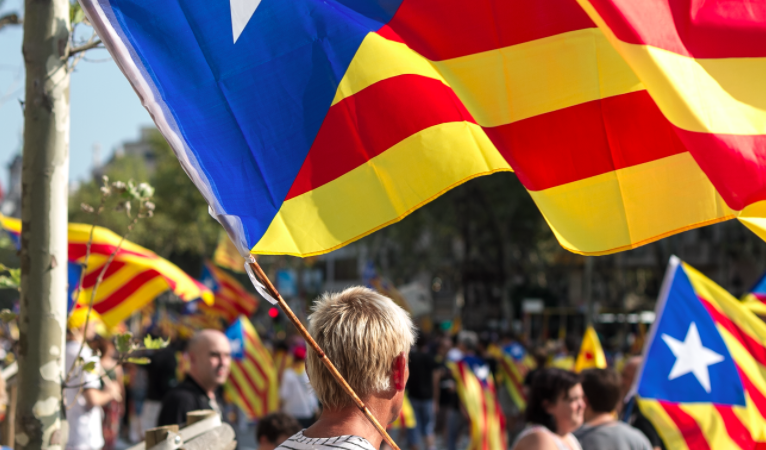In a cynical attempt to secure votes in the rest of Spain, the socialists have a long history of disrupting Catalan attempts at greater autonomy.

The Spanish Socialist Workers Party (PSOE) played a decisive role in preventing a legal referendum on Catalan independence. Now it’s complicit in an outright assault on the region’s autonomy, writes Kate Shea Baird in Barcelona.
As Catalonia heads into another week of political uncertainty, with direct rule from Madrid and the possibility of a unilateral declaration of independence on the cards, it’s worth examining the role of the Spanish socialist party, the PSOE, and its Catalan branch, the PSC, in getting us to where we are today.
Amid the ping-pong of mutual recriminations between Catalan President, Carles Puigdemont, and Spanish Prime Minister, Mariano Rajoy, it’s easy to overlook the socialist party’s share of the blame for the current crisis.
The PSOE is the only nominally progressive political party in Spain that doesn’t recognise Catalonia’s right to self-determination.
In the Catalan Parliament, the PSC voted against a declaration of the “right to decide” of Catalonia in 2013 and against requesting the power to hold a legal referendum from the Spanish Congress in 2014.
It was the PSOE’s refusal to accept a referendum in Catalonia that prevented it from gaining the support of Podemos to form an alternative government after the Spanish general election of December of 2015.
When repeat elections were held six months later, the socialists refused to budge on the issue and Rajoy resumed office.
In other words, the PSOE has been wilfully frustrating a legal, democratic solution to the Catalan question for years. Even so, its response to the referendum of October 1 and the events that followed verges on the grotesque.
Officially the PSOE is calling for dialogue and constitutional reform to give Catalonia more autonomy. Yet, at the same time, the party is backing the most authoritarian and repressive policies of the Spanish government, policies that are violating basic rights and freedoms and serving to escalate the conflict.
First, the PSOE’s reaction to the police brutality during the referendum, where over a thousand people were injured, was to blame the Catalan government “for taking politics from the institutions to the streets”.
Second, its Secretary General, Pedro Sanchez, has refused to condemn the detention without bail of Jordi Cuixart and and Jordi Sanchez, two Catalan civil society leaders charged with sedition for organizing peaceful demonstrations in late September.
Third, the socialist party is supporting Rajoy’s move to activate article 155 of the Spanish Constitution and implement direct rule over Catalonia.
This implies the removal of the Catalan government from office, a takeover of the Catalan police and public broadcasting services, and the neutering of the Catalan Parliament.
Unsurprisingly, the PSOE’s position is difficult for some of its members in Catalonia to swallow. The PSC has always struggled to maintain unity among its MPs in its opposition to Catalan self-determination, but the party’s support for repressive measures by the central government is putting it under increasing strain.
The PSC’s fiercely anti-independence leader, Miquel Iceta, was one of a number of socialist officials to criticise the detention of the two “Jordis” on sedition charges.
Most significantly, the decision to trigger article 155 has provoked a wave of condemnation from Catalan socialist leaders, including from four mayors who released a statement expressing their “most radical disagreement and rejection” of the move, and calling on the PSC not to support it.
One of them, the Mayor of Santa Coloma, Núria Parlón, has resigned from the executive committee of the PSOE in protest.
The PSOE has opposed a legal referendum, renounced the chance to remove Rajoy from office and supported the crushing of democratic governance in Catalonia.
This strategy may be a vote winner in Spain, where support for Catalan sovereignty remains below 50%, but it’s difficult to see how it contributes to the party’s stated goal of negotiating a new constitutional settlement that will be accepted by Catalan society.
Ironically, in its pursuit of law, order and unity, it may be the socialist party that does more than anyone else to convince Catalans of the impossibility of reforming Spain from within.
Kate Shea Baird has lived in Barcelona since 2008. She writes on Catalan and Spanish politics and is an activist in the Municipalist movement. She tweets here.




8 Responses to “The Spanish socialists must be held to account for blocking Catalan self-determination”
patrick newman
They dont want greater autonomy – they want independence. It does not make sense and PSOE is not wrong!
Dave Roberts
Another silly article on this site. It is business interest that want independence.
Jimmy Glesga
Strange that a left wing website would support right wing seperatists. The working class are supposed to unite!
Alasdair Macdonald
Replace ‘PSOE’ with ‘Labour’ and ‘Catalunya’ with ‘Scotland’ (or ‘Wales’, in the near future), and the article will read much the same. It is nearly a month since that doughty supporter of the right of peoples to self – determination, Mr Jeremy Corbyn made any statement on this Falange invasion of Catalunya. TV and Radio Catalunya are to be taken over.
Michael Cavanagh
this characteristic of labour parties that serve the established order and do not see the opportunity of independence movements is a deep concern and the left minded must logically reconcile the desire to achieve fundamental change with the defence of existing power structures. With the fragmentation of the bases of traditional institutional power structures comes the chance to construct new frameworks that enshrine the power of citizens. It also enables a constraining of capital in the exertion of power over public resources, policies and assets.